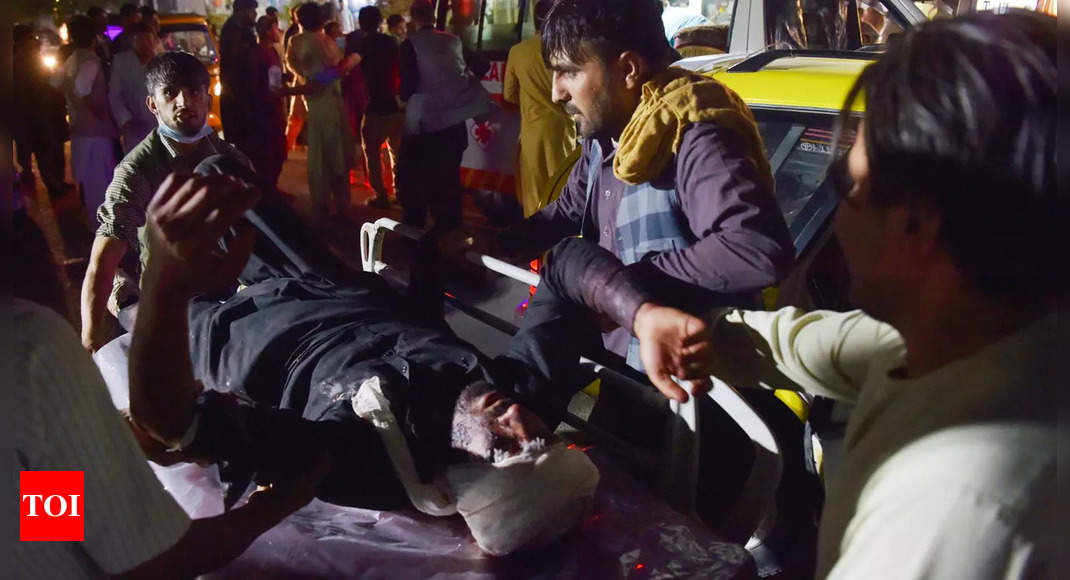Hours after terror attack warning, blasts outside Kabul airport kill 25 – Times of India
[ad_1]
The explosions, one of them outside Hamid Karzai Airport’s Abbey Gate, took place while efforts by Western forces to evacuate as many people as possible ahead of an August 31 deadline were underway. Some estimates put the toll as high as 40 dead. Four US Marines were killed, The Wall Street Journal reported.
The target was a sea of people desperate to catch a flight out of Taliban-controlled Afghanistan. According to the US and UK authorities, there had been an an imminent threat of a terrorist attack by the Islamic State affiliate IS-K (Islamic State of Khorasan).
A hospital in Kabul said more than 60 wounded had been brought there for treatment. US embassy sources and other witnesses said the explosions had been followed by gunfire.
The Taliban, who quickly condemned the attacks and said they had occurred in an area controlled by the US military, added that at least 13 people, including children and Taliban guards, had been killed in the explosions.
Hours before the suicide bombing, the UK, US and Australian governments had updated their travel advice to avoid Kabul airport due to an ongoing and high threat of terrorist attack. Fifteen hours after the UK travel advisory, a suicide bomber blew himself up in the sewage canal at the Abbey Gate of Kabul airport.
The Russian foreign ministry as well as the Pentagon spokesman placed the second explosion near the Baron Hotel, a short distance from the airport.
The majority of people waiting outside the airport for the last six or seven days, in sizzling heat and dust, have no travel documents. Having no realistic chance of boarding evacuation flights, they still hope to be airlifted following the departure of those with proper documentation. Observers said those without passports have made it difficult for a handful of people with proper documents, or those who are foreign nationals, to make their way through the crowd.
According to US and UK authorities, almost 100,000 people have now been evacuated from Afghanistan. The evacuees include the country’s educated and professional classes of men and women, part of a generation raised and groomed in the past two decades under the shield of the US military. “Educated and professional Afghans had heard nightmarish stories about the previous Taliban regime. For them, it was a dark and barbaric phase in the country’s history. They had not imagined that the ones they and their elders had despised so much would take over again,” Nur Rehman Sherzad, a prominent Sweden-based Afghan journalist who had left the country a few years ago due to the Taliban threat, told TOI.
Many Afghan politicians and ex-Afghan officials blame the chaos on exiled president Ashraf Ghani. They said that a peaceful transition could have taken place if he had not escaped along with his cohorts when the Taliban arrived at the gates of Kabul. The Taliban, according to them, had announced they would take over the capital in a peaceful manner through negotiations. Jawed Ludin, Afghanistan’s former ambassador and ex-president Hamid Karzai’s spokesperson, blamed Ghani for selling out and bringing shame to Afghanistan. “His failure would be pardonable if only he was authentic and had good intentions. The reality is that he was a third-rate academic and a wreck of a leader. Popularity and naked ambition got him to the top and he pulled down Afghanistan with him when he fell,” Ludin said.
Republican members of the US House Committee on Oversight have stressed that Ghani must be brought to justice and face criminal charges of embezzlement if he had indeed fled with duffle bags full of cash intended for the Afghan people. “It is critical that this investigation happens. US authorities will have their own reason to do this inquiry, but it is also important that it is pursued by other relevant stakeholders,” Ludin said in response to the US committee’s call for an investigation.
Meanwhile, Fahim Dashty, a member of the Panjshir-based National Resistance Front of Afghanistan, an anti-Taliban armed movement led by Ahmad Massoud, the son of the slain Afghan warlord and politician Ahmed Shah Massoud, said on Thursday that talks with the Taliban continue in Charikar, the capital of Parwan province in northern Afghanistan. He said the negotiations have so far helped prevent further fighting. The Taliban delegation for eh talks is led by Maulvi Amir Khan Mottaqi, while the delegation from neighbouring Panjshir includes former ministers and lawmakers from several provinces.
Panjshir is a narrow valley in the Hindu Kush mountains around 80 km north of Kabul. It is confronted by the Taliban from three sides but conquering it is considered extremely difficult. The valley has limited entry points and its geography offers a natural military advantage for defending forces who can effectively target invading forces.
Dashty vowed that if war was imposed on them, they would not only defend Panjshir but would fight from Panjshir for the rest of Afghanistan.
In Kabul, senior Afghan leaders, including former president Hamid Karzai and Abdullah Abdullah, the head of Afghanistan’s reconciliation council, continued to engage the Taliban and other stakeholders.
There are also reports that Karzai and Abdullah have proposed to shift their talks with the Taliban from Kabul to Doha. Another pro-Pakistan Afghan warlord and politician, Gulbaddin Hekmatyar, has insisted on continuation of talks in Kabul.
(With inputs from agencies)
[ad_2]
Source link


Comments are closed.